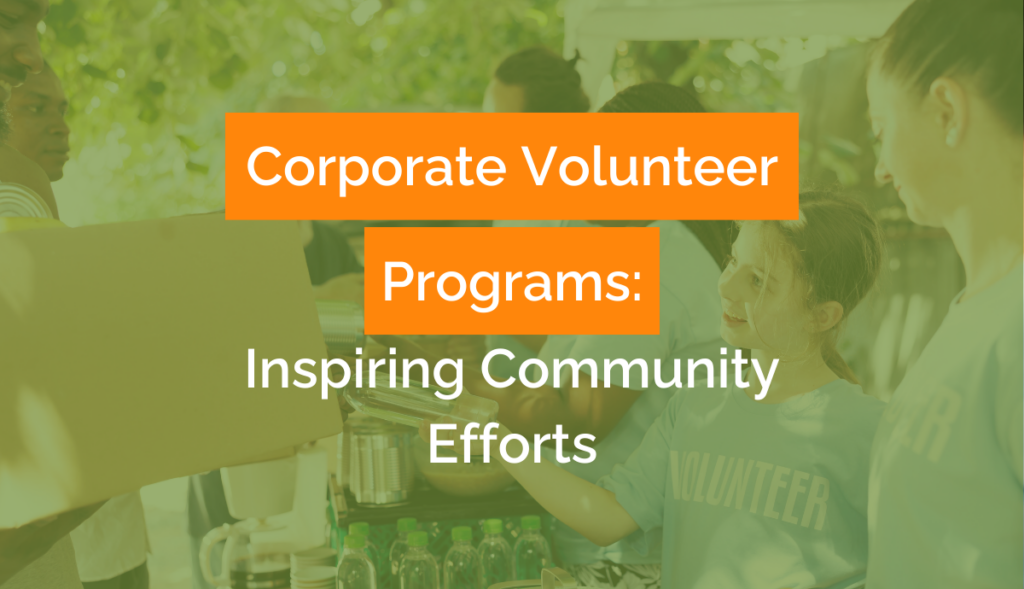
Corporate volunteer programs are more than just opportunities for employees to give back. They’re powerful tools for inspiring community involvement and fostering a sense of purpose within organizations.
When companies invest in volunteer initiatives, they create an avenue for employees to make a difference while strengthening the company’s ties to the community. From skills-based projects to team volunteer days and beyond, corporate volunteer programs bring people together, enhance employee engagement, and contribute to meaningful change.
In this post, we’ll explore the value of corporate volunteer programs, the types of initiatives companies can implement, and examples of how these efforts inspire a culture of community and service.
Let’s start with the basics!
What are corporate volunteer programs?
Corporate volunteer programs are structured initiatives set up by companies to encourage and facilitate employees’ involvement in volunteer activities. These programs are a core part of many businesses’ Corporate Social Responsibility (or CSR) strategies and are designed to give back to the community while engaging employees in meaningful ways.
There are a few types of corporate volunteer programs that a company will generally organize. These include:
We’ll go into greater detail about each program type below. Interested in a particular kind of corporate volunteering? Feel free to click around and jump to each section to learn more.
All in all, these programs offer significant benefits for both employees and employers—as well as the nonprofits they support. For employees, volunteering provides a sense of fulfillment, opportunities to build skills, and a chance to connect with colleagues on a deeper level. For companies, volunteer programs enhance brand reputation, strengthen community ties, improve employee morale, and contribute to a more positive workplace culture.
And, perhaps most obviously, nonprofits benefit from increased volunteerism, providing them with additional manpower, expertise, and resources that they might not otherwise have access to. This support enables organizations to expand their reach, complete critical projects, and better serve their communities.
Volunteer Grants
Volunteer grants, also known as “Dollars for Doers,” are corporate programs that provide monetary donations to nonprofits where employees volunteer. Companies generally offer these grants as a way to amplify the impact of their employees’ volunteer hours.
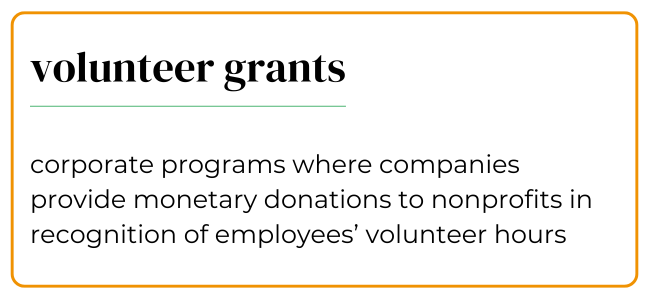
This program benefits nonprofits by turning volunteer hours into financial support, which can help fund additional resources, cover operating costs, or expand program initiatives. It also motivates employees to volunteer more consistently, providing nonprofits with a steady stream of dedicated volunteers.
Check out the example: Walt Disney Corporation’s VoluntEARs Program
Walt Disney Corporation’s VoluntEARs Program is a well-established volunteer initiative designed to encourage Disney employees to engage in community service. To motivate and recognize the contributions of its employees, Disney provides financial grants to nonprofit organizations based on the volunteer hours contributed by its employees.
Here’s how the program works:
- Employees volunteering between 10 and 24 hours earn a $250 grant.
- Employees volunteering between 25 and 49 hours earn a $500 grant.
- Employees volunteering between 50 and 74 hours earn a $1,000 grant.
- Employees volunteering between 75 and 149 hours earn a $2,000 grant.
Additionally, the company offers “VoluntEARS of the Year” grants that recognize exceptional individual volunteers, typically in the amount of $2,500.
Over the years, Disney VoluntEARs have collectively contributed millions of hours of service, illustrating the program’s substantial impact on communities and the dedication of Disney employees to philanthropy. As a result, Disney enhances its reputation as a socially responsible company committed to giving back to society.
Learn more about Disney’s volunteer programs here.
Volunteer Time Off
Volunteer Time Off programs (also known as VTO) allow employees to take paid time off during their work hours specifically to engage in volunteer activities.
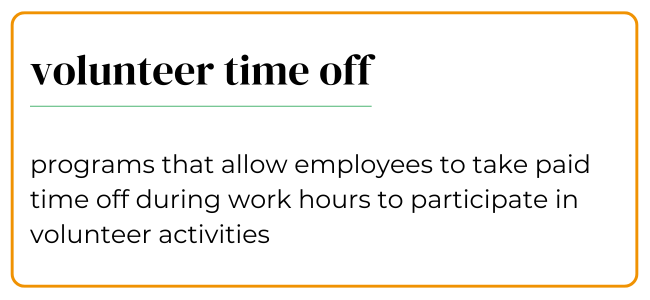
VTO programs encourage employees to give back without sacrificing their personal time or pay, leading to higher participation in volunteerism. As a result, nonprofits benefit from VTO by gaining access to volunteers who might otherwise be unable to participate. This often results in a more consistent and reliable volunteer base, particularly during weekdays when many nonprofits need help but may struggle to find volunteers.
In the end, VTO programs help nonprofits receive skilled support while building ongoing relationships with corporate partners.
Check out the example: Patagonia’s Environmental Internship Program
Patagonia’s Environmental Internship Program is a unique VTO initiative that reflects the company’s deep-rooted commitment to environmental activism and corporate social responsibility. Within the program, employees are allowed to take up to two months of paid leave to volunteer full-time with the environmental organizations of their choice.
From there, employees engage in a variety of environmental efforts, such as habitat restoration, wildlife conservation, community education, and advocacy for environmental policies. The specific projects vary widely, allowing participants to choose organizations and activities that align with their skills and interests. As a result, the program provides employees with an opportunity to develop new skills and broaden their knowledge of environmental issues, which can translate to a stronger, more informed workforce.
Over the years, the Environmental Internship Program has facilitated thousands of employee hours devoted to environmental action. This has led to meaningful contributions to conservation efforts, advocacy campaigns, and on-the-ground environmental work, showcasing how a corporate initiative can create a ripple effect of positive change.
Learn more about Patagonia’s volunteer programs here.
Skills-Based Volunteerism
Skills-based volunteerism involves employees using their professional skills—such as accounting, marketing, IT, or legal expertise—to assist nonprofits in specific areas.
Unlike general volunteer work, skills-based volunteering provides nonprofits with specialized services that may otherwise be costly or out of reach. For instance, a marketing team might help a nonprofit develop a social media strategy, or IT professionals might assist with a tech upgrade.
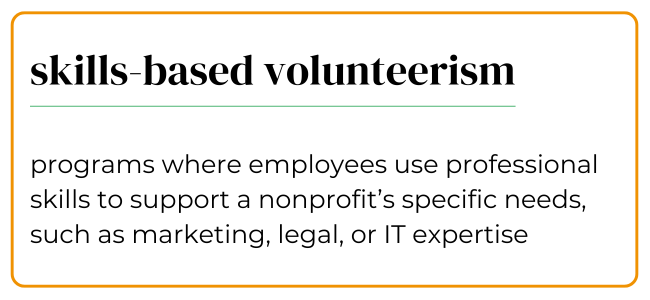
This type of volunteerism enhances a nonprofit’s operational efficiency and long-term sustainability by improving areas such as financial planning, digital presence, or strategic growth—ultimately empowering the organization to achieve its mission better.
Check out the example: Deloitte’s Pro Bono Program
Deloitte’s Pro Bono Program is an impactful initiative that leverages the company’s professional expertise to support nonprofit organizations and other fundraising groups. The effort allows Deloitte employees to use their specialized skills—from management consulting, financial analysis, and technology solutions to human capital advisory and strategic planning—to help nonprofits address complex challenges.
By supporting organizations with pro bono services, Deloitte helps nonprofits build capacity, optimize their operations, and amplify their impact at no cost. This assistance enables causes to deliver more effective services and expand their reach within communities, too. Pro bono services enable nonprofits to access expertise that they might not otherwise afford, empowering them to operate more effectively and expand their positive impact in their respective communities.
Overall, Deloitte has contributed millions of dollars in pro bono services and has supported hundreds of nonprofit organizations. The program’s success is reflected in the lasting relationships built and the measurable improvements made in the effectiveness and scalability of nonprofits’ missions.
Learn more about Deloitte’s volunteer programs here.
Team Volunteer Events
Team volunteer events are organized group activities where company employees work together on a community project, often during a designated day of service.
These events create a powerful impact on nonprofits by mobilizing a large number of volunteers at once, allowing them to complete labor-intensive projects—such as landscaping, sorting donations, or painting facilities—in a shorter time frame.
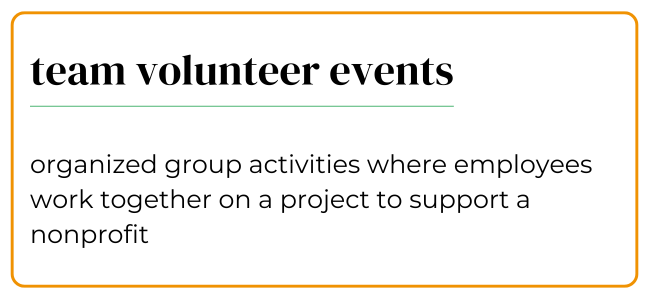
Nonprofits benefit from the concentrated support of a motivated team, which can be particularly useful for special events or large-scale projects. Team volunteer events also foster strong ties between companies and nonprofits, often leading to sustained partnerships, repeat volunteer efforts, or even direct financial support.
Check out the example: Google’s GoogleServe Program
Google’s GoogleServe Program is an annual, month-long company-wide volunteer initiative that reflects Google’s commitment to community service and social impact. This program encourages Google employees, known as “Googlers,” to contribute their time and skills to nonprofit organizations and community projects around the world.
GoogleServe activities range from short-term projects to in-depth engagements where employees apply their professional expertise. The flexibility allows Googlers to choose volunteer opportunities that fit their interests and schedules, whether they involve hands-on community service or providing strategic consulting for nonprofits—including on the company’s no-cost Google Ad Grant program.
GoogleServe also serves as a team-building opportunity, bringing employees together to collaborate outside their usual work environment. This collaborative spirit fosters a culture of giving back and strengthens team cohesion within the company. Thus, GoogleServe reinforces a company culture that values social responsibility, empowering employees to make a difference beyond their daily work.
Learn more about Google’s volunteer programs here.
Next Steps
Corporate volunteer programs offer a powerful win-win opportunity, benefitting both the company and the communities it supports. After all, these initiatives enable businesses to contribute positively to society, enhance employee satisfaction, and build stronger community bonds. And it’s all in a way that drives forward organizations like yours.
By supporting volunteerism, companies cultivate a culture of compassion, collaboration, and purpose that resonates beyond the workplace. Whether through skills-based volunteering, team service days, or volunteer grants, corporate volunteerism has the potential to inspire lasting community impact and reinforce a company’s commitment to social responsibility and beyond.
Let these programs be a driving force in your organization’s journey to inspire and uplift the communities you serve. Don’t let their impact go to waste!
Read now: 8 Effective Strategies for Marketing Corporate Volunteerism

